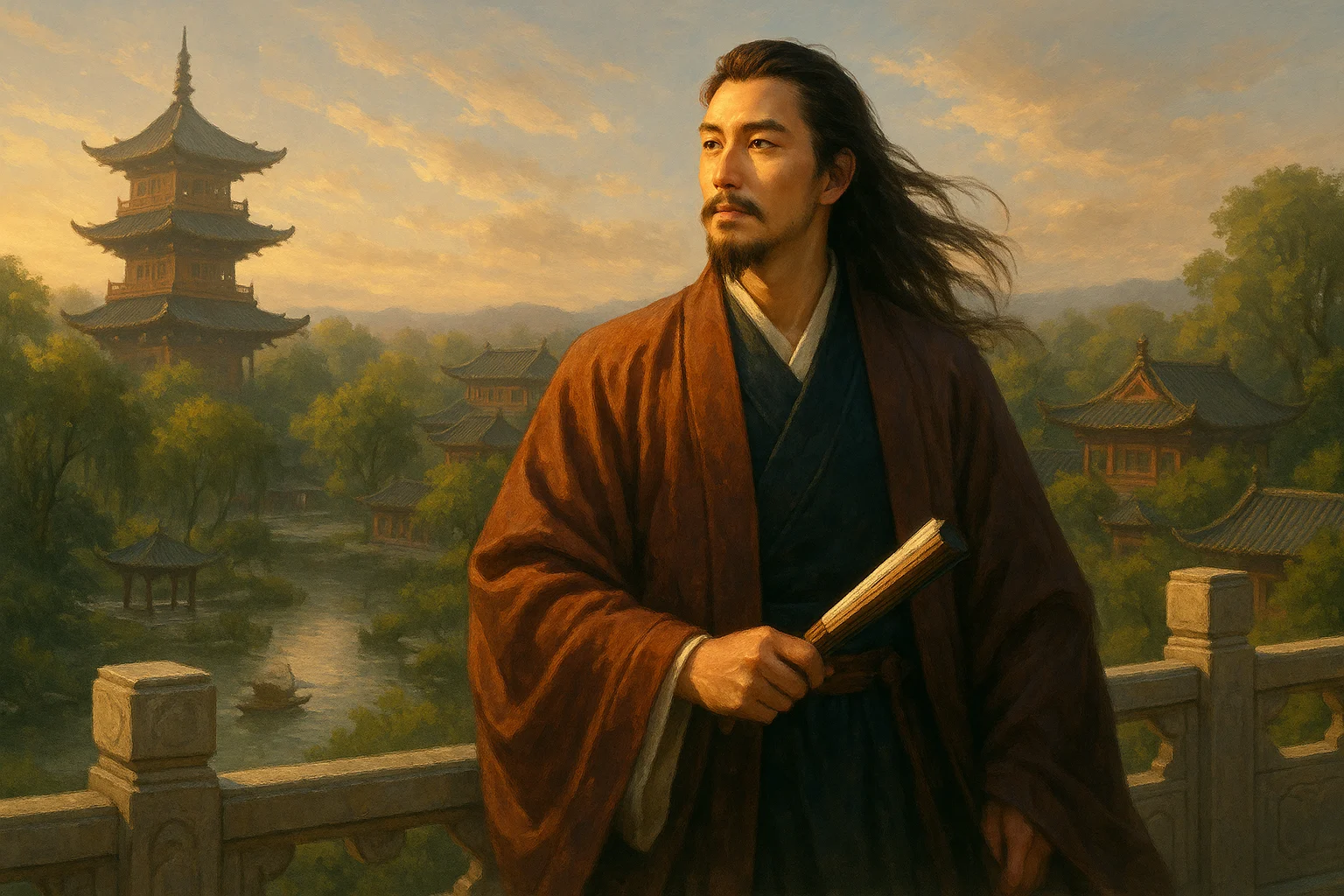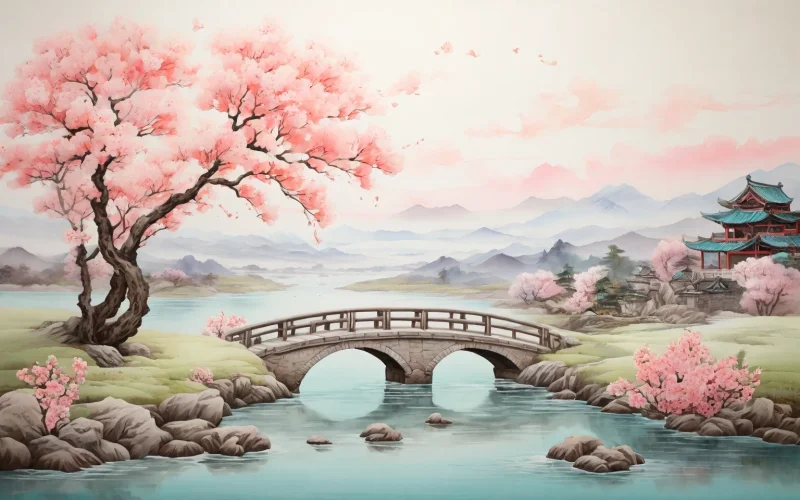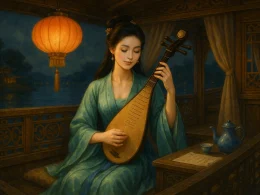Rain drums on southern trees all night—
By dawn, blossoms erupt in sight.
Leaves weave ever-thickening veils,
Hiding paths of past travels.
Where we met, who could foresee
Spring would near its elegy?
Toast the east wind with this plea:
Don't rush! Don't flee!
Original Poem
「伤春怨 · 雨打江南树」
雨打江南树。一夜花开无数。
绿叶渐成阴,下有游人归路。与君相逢处。不道春将暮。
王安石
把酒祝东风,且莫恁、匆匆去。
Interpretation
This ci poem was composed during Wang Anshi's retirement in Zhongshan, Jiangning. Though no longer engaged in political affairs, his reflections on time and worldly matters remained profound. Through its depiction of Jiangnan's spring scenery and lament for the season's passing, the poem conveys the poet's deep sensitivity to life's transience and the fragility of beauty. It expresses both his emotional connection to nature and his philosophical musings on life, serving as a spiritual refuge. Stylistically akin to his other late works like Pride of the Fisherman and Song of the Southern Country, it embodies the serene restraint and emotional depth characteristic of his later years.
First Stanza: "雨打江南树。一夜花开无数。绿叶渐成阴,下有游人归路。"
Yǔ dǎ jiāng nán shù. Yī yè huā kāi wú shù. Lǜ yè jiàn chéng yīn, xià yǒu yóu rén guī lù.
Rain falls on southern riverside trees,
countless blossoms bloom overnight.
Green leaves now form cooling shade,
beneath which wanderers tread homeward paths.
The opening line portrays gentle spring rain nurturing rather than destroying the blossoms, subtly echoing Du Fu's famous line about "rain knowing its season." The progression from rain to blossoms to leafy shade traces spring's fleeting beauty, while the "homeward paths" suggest both the season's cyclical nature and the poet's own contemplative retreat.
Second Stanza: "与君相逢处。不道春将暮。把酒祝东风,且莫恁、匆匆去。"
Yǔ jūn xiāng féng chù. Bù dào chūn jiāng mù. Bǎ jiǔ zhù dōng fēng, qiě mò nèn, cōng cōng qù.
Here where we met, dear friend,
who knew spring would fade so soon?
With wine I toast the east wind:
"Do not hasten away!"
The stanza shifts from observation to personal address, where "dear friend" may refer to either a companion or spring itself. The ceremonial wine offering to the wind transforms personal lament into a universal plea against time's passage, blending private emotion with cosmic perspective.
Holistic Appreciation
This compact masterpiece balances delicate imagery with philosophical depth. The first stanza's objective progression from rain to shade mirrors nature's cycles, while the second stanza's sudden personal address creates emotional immediacy. What begins as scenic observation culminates in a poignant dialogue with the forces of nature.
Unlike conventional spring laments that indulge in sorrow, Wang's poem maintains intellectual composure. His plea to the wind acknowledges nature's indifference while asserting human tenderness - a characteristic blend of rationalism and lyricism marking his unique voice among Song dynasty poets.
Artistic Merits
- Symbolic progression
The natural imagery (rain, blossoms, shade, paths) forms a symbolic sequence tracing spring's lifecycle. - Ceremonial gesture
The wine offering elevates personal emotion into ritual significance. - Ambiguous address
The "dear friend" reference creates layered meaning, allowing both personal and allegorical readings. - Restrained emotion
Emotional intensity is conveyed through formal restraint rather than explicit declaration.
Insights
This poetic work embodies rich philosophical reflections and political metaphors. It teaches us that even when confronted with dark clouds and uncertain paths, we should not succumb to despair or confusion. By remaining observant and steadfast in belief, the "thousand sails" will eventually appear, and the way forward will clear. This ability to derive wisdom from scenery and find vitality in poetry reflects the ancient literati's poetic cultivation and moral character.
The poem also reminds us to cherish present beauty, for springtime splendor must eventually fade. Wang Anshi transforms his sorrow for spring's passing into a plea to the east wind, converting helpless melancholy into poetic invocation. This tender yet unmelancholic sentiment, this appreciation of time without desperate clinging, reveals a scholar's profound understanding of nature, life, and temporal passage.
Moreover, the whispered "Do not hasten away" serves both as entreaty to the wind and quiet dialogue with time itself. Such poetic conversation between humanity and nature represents the highest form of classical Chinese literary spirit - where personal emotion expands to cosmic scale without losing its authentic voice. For contemporary readers, this artistic approach offers not just aesthetic pleasure but a model for maintaining spiritual resilience amid life's inevitable transitions.
About the Poet

Wang Anshi (王安石 1021 - 1086), a native of Linchuan in Jiangxi, was an outstanding statesman, writer, and thinker of the Northern Song Dynasty, counted among the "Eight Great Prose Masters of the Tang and Song Dynasties." His poetic achievements were particularly profound—his early works, filled with heroic language, revealed the ambition of a reformer. Though his ci poetry was few in number, it pioneered new realms of historical reflection. His poetry and prose combined intellectual depth with artistic value, and the over 1,500 works preserved in The Collected Works of Linchuan stand as a monumental testament to literary innovation in Song Dynasty literature.












